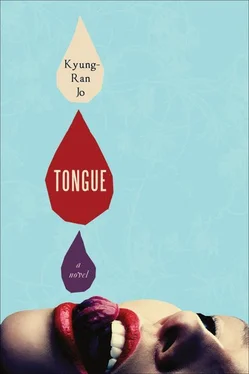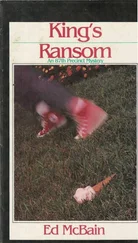When I was in cooking school, Chef preferred to teach common sense or the history of ingredients or the behavior of cooks rather than how to cook. And even now he remembers what customers ate and drank on their first visits, which impresses them. Even the way he conveys his knowledge is natural and subtle. This isn’t so much a sales gimmick as his conviction as a chef, as the owner of Nove. Whenever he does it, Manager Park shakes his head, jaw dropping, and says, I still have a long way to go! Chef would have been Beauvilliers had he lived in the nineteenth century. Customers keep returning to the restaurant—to regain strength or for a special dinner or because they don’t have time to cook or don’t want to.
The restaurant is fully booked for every meal in May because of its numerous holidays—Coming-of-Age Day, Parents’ Day, Children’s Day, Teachers’ Day. The kitchen becomes chaotic. In May, Chef reminds us during the morning staff meeting that we shouldn’t use perfume, scented lotions, or shampoo. This reminder kicks off the busiest month and the start of summer. When seven cooks, sometimes including Chef, are stuck together like wooden chopsticks in the small kitchen, you can smell cigarettes and each other’s sweat and even bodily fluids discharged during the previous night. Smell, especially that of food, has weighty particles, and when it’s hot they can’t rise and end up hovering near the bottom. It’s also around this time that we raise our voices when even small accidents happen. In May you can’t take off work except for your regular days off. But even if it was my day off I would have headed into work after receiving that phone call yesterday. I don’t want to rest, not for even a day. I come to work earlier than anyone else and do chores that aren’t mine, prepping ingredients and going to the market and bustling about as if I’ll become frozen if I stop for five minutes. Every time I move, I hear my disjointed bones rattling in my body.
Before, I used to look at the world as if a piece of glass separated me from it. If the glass was cracked or broken, the other side of the glass would look like barely fitting puzzle pieces even if everything was perfect. The glass I look through now has thousands of irreparable spidery cracks in it. If you don’t give up and you wish with all your strength that things go back to the way they were, maybe it could happen despite the cracks. But that’s not common. I know when it’s time to give up.
When I was seven years old, I was always home alone while Grandmother was at work and Uncle at school. I went into the kitchen and brought out a spoon and started to dig in the corner of the yard. When the spoon became bent and unusable, I burrowed with a ladle. I went to the well across the yard and drew water and poured it into the hole. The water disappeared silently into the dirt but I dug wider and deeper and poured in more water. I went back and forth between the well and the hole until the sun went down. I thought I would be able to make a pond. But water didn’t remain in the hole even though I poured and poured—it just vanished into the dirt. I continued to trot between the well and the hole for the satisfaction I got in that short moment—the instant before the water completely melted into the ground. But then I stopped. I realized I wouldn’t be able to make a pond no matter how hard I tried. It’s now time to stop pouring water into the ground. I make this decision and discover I’m changed. A subtle but powerful feeling.
The first change is a realization that I am no longer alone. Even when I’m lying in the dark by myself, I now sense other beings hovering near me. It isn’t just me living in this house, but unfinished love and my dejection and anger and dead Paulie, and their miraculous presence feels as real as my fingernails digging into my hand. The second change is that I’m now more obsessed with cooking, like the Roman gourmets and their cherished chefs, who wanted to put all things wonderful or special or new or majestic or strange or scary-looking on the table. The cooks back then knew only how to bake or boil, but I understand how a few drops of pomegranate juice can transform a dish. The third change is that with these first two revelations, my sense of taste has become ever more sensitive and sharp, my imagination richer. When I got my ears pierced and walked into the street in the middle of winter, I became one large ear. All sensation and pain were concentrated in my ears. My entire body vanished and I floated around the winter streets, just two giant ears. It’s that same feeling. Everything about me disappears and I’m only a pink tongue. This is the time to grow into a truly good chef. I see an increase in customers who specially order my dishes. People come to restaurants for various reasons but everyone really wants the same thing: a delicious meal. A meal that satisfies their tongues. A meal that brings a smile at its close. All of these customers are gourmets—intelligent, sensitive, with good appetites and acute senses. A good appetite no longer is the subject of condemnation or avoidance as it was during the Middle Ages; rather, it’s the height of beauty and nature and enjoyment. I am surrounded by those with appetites, which triggers the desire for taste, for a physical sensation. I want to create the perfect meal.
Slicing turbot in half is an insult to the fish, and it’s rude to have a mediocre cook handle foie gras. Tonight we need to pay the most attention to the table of Mr. Choe, the owner of Mido, who helped Chef become the owner of Ristorante when he was head chef, before Chef renamed it Nove. Chef will cook the entrée, as he always does when Mr. Choe comes in, and I’m to make the second antipasto: asparagus and foie gras. After we returned from Singapore, we became something like confidants to one another. Was it that we each saw the other’s true face that night, normally hidden behind many masks?
I hurry. I take five hundred grams of foie gras, hardened by a sprinkling of salt. It’s dark red with a sheen and it’s firm, like the tongue of a calf. It’s a fresh, good-quality liver. But I smile bitterly. I can’t eat foie gras anymore after I learned how geese were farmed. A cook should eat everything, but even a cook balks at eating certain things, delicious or not. I know cooks who can’t eat poultry or those who can’t eat fish with teeth, like stingray. I can eat crustaceans feeding on spoiled flesh and Milanese sausages stuffed with chopped pig brains, but goose liver is a different story.
A goose hatches in the spring and fattens during the fall. The liver is the best part of a goose. The goose is fed only vegetables in the warm darkness until it’s fat enough, and to make the liver even more tender, to make it the best product, for twenty days it’s fed only dried figs softened in water. A goose has a strong immune system and it’s fairly easy to pull its beak open and force-feed it, allowing for less manpower—but these days, to eliminate even this work, the part in the brain that regulates appetite is removed. All you have to do is paralyze the goose, connect electrodes to the base of its brain, and turn on the electricity. Afterward you cage the goose under artificial lighting and it continues to eat, deep in its hallucinations. Within a week the goose is as fat as if it’s been fed for a month, and so is its liver. If you take out its eyes, you can fatten it up even more.
I rush out of the kitchen and run into the bathroom. It’s as if an eyeless, hallucinating goose is pacing behind me, eating endlessly under artificial lights. I vomit. A sourness rushes up. If you give a goose an egg-shaped rock, it will nestle and protect it without any suspicion. It will look after anything as one of its own, even a cloth doll. Geese develop a continuous attachment to the object they first encounter—the imprinting phenomenon is especially strong in a goose. A gosling develops an unconditional attachment with the first moving object it sees. It could be its mother or a sibling, a cat or a dog, a person or a motorcycle or a tractor. Even if it is the wrong focus of attention, the goose can’t put an end to its unrequited courting. I throw up once more and press the toilet lever with irritation.
Читать дальше












